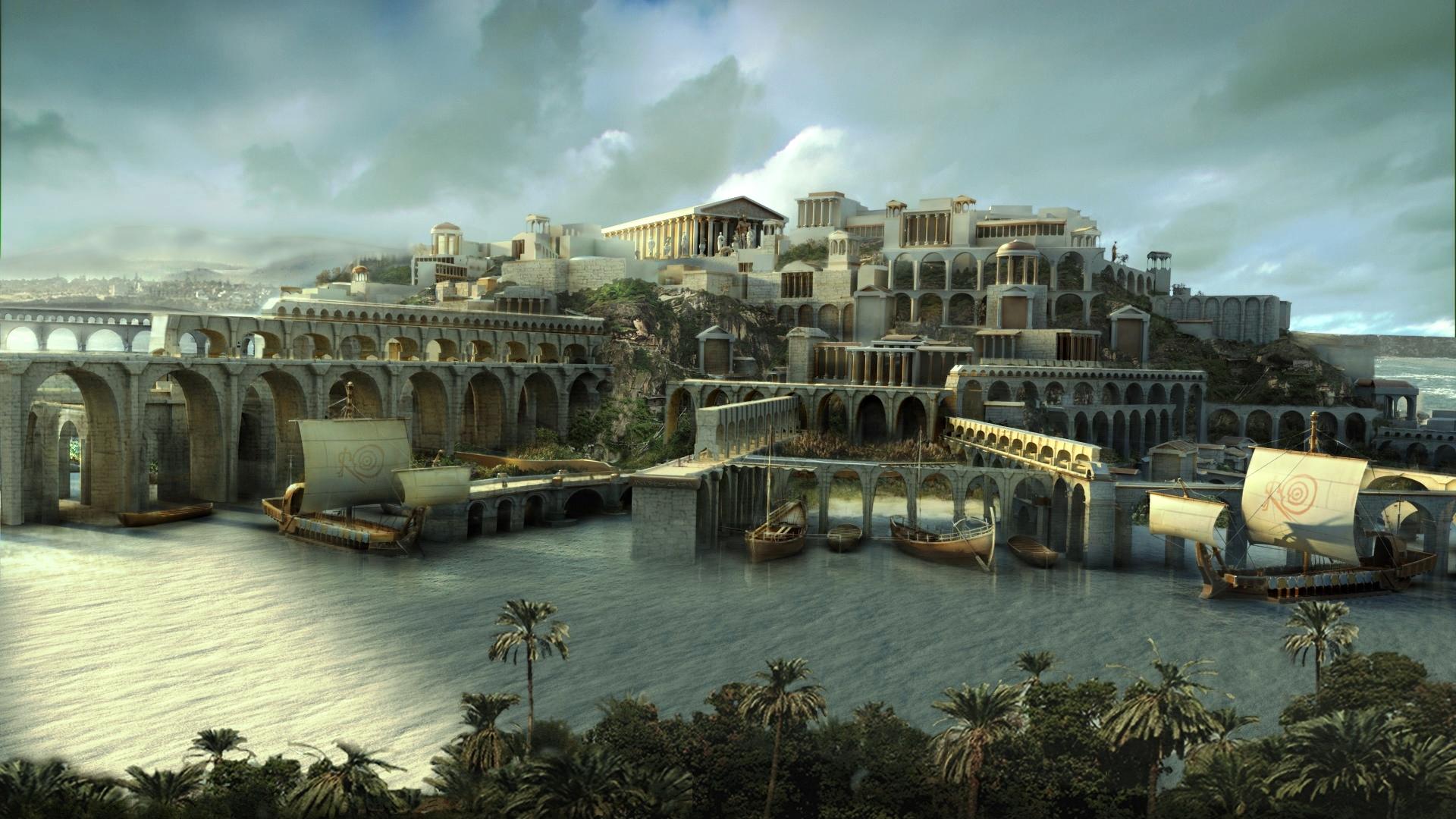
The Mystery of the Lost City of Atlantis: Fact or Fiction?
The Lost City of Atlantis. The very name conjures images of shimmering temples, advanced technology, and a civilization swallowed by the sea. For centuries, this mythical place, first described by the ancient Greek philosopher Plato, has captivated the human imagination. Its allure stems from its tantalizing blend of mystery and possibility – a powerful, advanced civilization inexplicably lost to time. But was Atlantis a real place, a vibrant society that once thrived in the distant past, or is it purely a figment of Plato’s philosophical imagination, a carefully constructed allegory? This exploration delves into the historical and mythological narratives surrounding Atlantis, examining the evidence, theories, and enduring legacy of this enigmatic island. We will navigate the labyrinth of interpretations, from literal searches for sunken ruins to analyses of the deeper symbolic meanings embedded within Plato’s accounts.
Plato’s Account: The Seeds of a Legend
Plato’s dialogues Timaeus and Critias, penned around 360 BC, provide the foundation for the Atlantis legend. In these works, he describes Atlantis as an island empire situated beyond the “Pillars of Hercules” (the Strait of Gibraltar). This island nation, supposedly more powerful than ancient Athens, possessed a remarkably advanced civilization. Plato’s depiction is vivid, portraying a sophisticated society with intricate canals, magnificent architecture, and a complex social structure governed by a priestly class. The Atlanteans, purportedly descendants of the sea god Poseidon, possessed advanced knowledge of engineering, agriculture, and military prowess, ruling over a vast territory and engaging in both conquest and exploration. However, Plato presents Atlantis not as a celebratory account of a utopian society but rather as a cautionary tale, narrating its swift and cataclysmic demise – a sudden, devastating event that plunged the island and its inhabitants into the depths of the ocean. This catastrophic downfall is portrayed not just as a geographical tragedy, but also as a moral lesson on the perils of hubris and unchecked power.
The specifics of Plato’s account fuel much of the ongoing debate. He meticulously describes the concentric circles of land and water that formed the city’s layout, the elaborate temples dedicated to Poseidon, and the advanced weaponry utilized by the Atlantean army. While clearly imbued with elements of fiction and perhaps incorporating elements of other known societies, the detail offered by Plato is what has given the legend such enduring power. The precise nature of the cataclysm that destroyed Atlantis – whether a volcanic eruption, earthquake, tsunami, or some other disaster – remains a subject of ongoing speculation and diverse interpretations.
Locating Atlantis: A Global Search for a Sunken Kingdom
The lack of concrete, verifiable evidence regarding Atlantis’ existence has not deterred countless individuals from seeking its location. Over the centuries, numerous theories have emerged, proposing locations ranging from the Mediterranean Sea to the Atlantic Ocean, and even the Americas. Some scholars point to potential correlations between Plato’s description and specific geographical locations or historical events.
The Mediterranean Hypothesis: Several sites in the Mediterranean have been proposed as possible locations for Atlantis, given their proximity to the “Pillars of Hercules.” The island of Crete, home to the Minoan civilization known for its advanced culture and sophisticated architecture, is frequently cited. The Minoan civilization’s catastrophic decline around 1450 BC, possibly due to a volcanic eruption or a series of earthquakes, resonates with Plato’s account of Atlantis’ sudden destruction. However, the Minoan civilization’s destruction occurred over a period of time, not in a single day and night as Plato details. Other Mediterranean candidates include locations in modern-day Greece or Turkey, areas with rich archaeological histories offering potential parallels to some of Atlantis’ features, although no direct connections have yet been substantiated.
The Atlantic Hypothesis: The Atlantic Ocean, with its vast expanse and numerous islands, provides fertile ground for speculation. The Azores and Canary Islands, volcanic archipelagos with unique geological features, have been suggested as potential locations. These islands could conceivably have been larger in the past, perhaps even connected, providing a more plausible geographical setting for an extensive island empire. The potential for submerged ruins in this area fuels the continuing exploration and research efforts in these island groups.
The Americas Hypothesis: Some researchers have even explored the possibility of Atlantis being located in the Americas, pointing to similarities between Plato’s description and certain aspects of pre-Columbian civilizations. Specific locations in South America and the Caribbean have been considered, although the lack of consistent archaeological evidence connecting these cultures to Plato’s description remains a major challenge to this theory.
The “Antikythera Mechanism” and Technological Parallels: The discovery of the Antikythera Mechanism, a complex ancient Greek astronomical calculator, has added another layer to the Atlantis enigma. Its intricate design and advanced engineering capabilities suggest a level of technological sophistication far beyond what was previously believed possible for that period. Some speculate that this mechanism and other potential technological advancements of the ancient world could support the notion of a previously advanced civilization, perhaps Atlantis itself. However, this remains conjecture, as no direct link between the Antikythera Mechanism and Atlantis has been established.
The Archaeological Quest: Unveiling Submerged Secrets
The search for Atlantis has spurred extensive underwater archaeological expeditions. The development of advanced sonar technology and remotely operated vehicles (ROVs) has expanded the scope of underwater exploration. Numerous underwater structures have been discovered, adding to the intrigue surrounding the possibility of submerged ancient cities. While many of these discoveries prove to be natural geological formations or less significant historical sites, these explorations continue to fuel the ongoing debate regarding the existence of a lost civilization. The discovery of submerged cities like Shicheng in China, although not directly linked to Atlantis, demonstrates the potential for significant underwater archaeological finds. The exploration of underwater caves and the use of advanced imaging techniques offer promising avenues for future discoveries that might shed light on this enduring mystery.
Atlantis in Culture: An Enduring Symbol
Whether fact or fiction, Atlantis has had an undeniably profound impact on Western culture and imagination. Its legend has permeated literature, art, and popular culture, becoming a powerful symbol of a utopian past, technological advancement, and the potential for both grandeur and catastrophic downfall. Many artistic interpretations have emerged over the centuries, shaping perceptions of Atlantis from depictions of idyllic societies to warnings against the dangers of unchecked power.
Literature and Art: Atlantis has inspired countless works of literature, from Francis Bacon’s utopian novel New Atlantis to H.P. Lovecraft’s tales of cosmic horror, reflecting the multifaceted interpretations of the legend. Visual artists have also embraced the theme of Atlantis, depicting its lost civilization in varying degrees of realism and fantasy.
Film and Television: Hollywood has embraced the Atlantis legend, producing numerous films and television shows depicting the lost city and its inhabitants. These cinematic representations range from historical dramas to science fiction adventures, often incorporating elements of fantasy and adventure to enhance the visual and narrative appeal. The versatility of the legend allows for creative license, enabling diverse interpretations of the story across various genres.
Video Games: The video game industry has frequently incorporated the legend of Atlantis, using the theme to create compelling storylines and immersive worlds. The enduring nature of the legend makes it a rich source of inspiration for game developers seeking to create engaging and memorable narratives, often drawing on multiple facets of the myth.
The Legacy of Atlantis: Questions of History and Humanity
Beyond its cultural impact, the Atlantis legend prompts profound questions about the nature of civilization, the rise and fall of empires, and the relationship between humanity and the natural world. The story serves as a potent metaphor for the fleeting nature of power, the cyclical nature of history, and the potential for both remarkable achievements and catastrophic setbacks. The legend invites reflection on the role of human ambition, societal structures, and environmental factors in shaping the course of history.
The debate surrounding Atlantis serves as a broader reflection on how we interpret historical narratives, distinguish fact from fiction, and reconcile competing accounts of the past. The legend’s enduring appeal may stem from its inherent ambiguity, leaving room for multiple interpretations and fostering ongoing discussion and debate. It encourages exploration of philosophical concepts about the nature of truth, memory, and the human desire to understand our past.
A Final Verdict: The Enduring Mystery
The question of whether Atlantis was a real place remains ultimately unresolved. The lack of concrete archaeological evidence poses a significant challenge to those seeking to prove its existence. Yet, the legend persists, fueled by its powerful imagery, philosophical resonance, and the enduring human fascination with the unknown.
Atlantis, whether a literal historical place or a philosophical construct, continues to inspire and fascinate. Its legacy transcends simple factual verification; it encompasses the power of myth, the enduring allure of the unexplored, and the reflection on humanity’s place within a broader historical and environmental context. The continued search for Atlantis is not simply a quest for a lost city; it’s a quest for deeper understanding of ourselves, our history, and our relationship with the planet we inhabit. The mystery remains, and its enduring appeal will likely continue to captivate generations to come.


